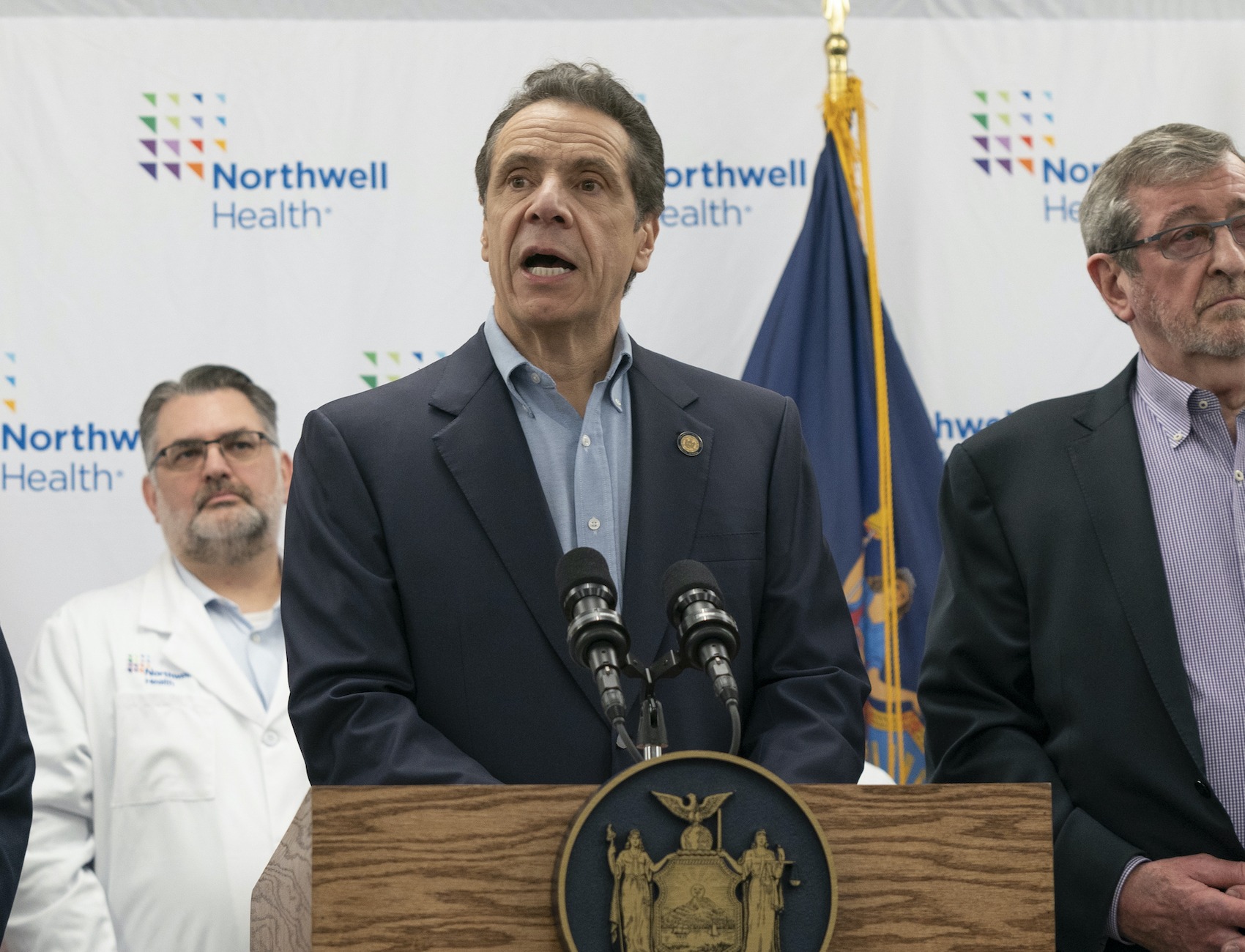Pressure Builds on New York Governor To Address Coronavirus Impact on Prisoners
Andrew Cuomo, who recently announced the state would employ prisoners to make hand sanitizer, must prepare for the particular vulnerabilities of the state’s prison population to COVID-19, advocates say.

Advocates are calling on New York Governor Andrew Cuomo this week to change his response to coronavirus to better serve the state’s jail and prison populations.
Cuomo announced Monday that the state would produce up to 100,000 gallons per week of its own hand sanitizer to distribute to “high impact areas” and state agencies, including prisons, at no cost. But nearly 100 incarcerated people will make the hand sanitizer for just cents an hour, and they may not be able to use it.
“Our governor is exploiting the unethical clause of the Thirteenth Amendment for his own gain,” Eileen Maher, a community leader at VOCAL-NY, a nonprofit that advocates for criminal justice reform, said at a press conference on Tuesday morning. The amendment, which outlawed slavery, includes a loophole for “punishment for crime whereof the party shall have been duly convicted.” Prisoners in the U.S. can be made to work for less than a dollar an hour.
Corcraft, a state-run company that relies on prison labor to produce products for the state, will produce the hand sanitizer. Prisoners who work for Corcraft are paid a minimum wage of $0.16 an hour and can get increases up to $0.65 per hour, according to the New York Department of Corrections and Community Supervision (DOCCS). The last time prisoners in the state got a pay raise was in 1993.
Those incarcerated may not be able to refuse the work, either. Prisoners are required to “participate in programs as assigned,” including work assignments, and refusing to do so is considered a violation of rules that could result in loss of good time credits or being placed in solitary confinement.
Prisoners in New York State prisons are already banned from possessing most hand sanitizer because it contains alcohol; possessing it could result in being placed in solitary confinement. New York State’s version will be 75 percent alcohol, according to the governor’s office.
Advocates are also concerned about how New York prisons and jails will respond to coronavirus within their walls.
Prisoners are particularly at risk as they are housed in close quarters. Homer Venters, the former chief medical officer at Rikers Jail Complex told The Marshall Project, “Jails and prisons are often dirty and have really very little in the way of infection control,” noting that there are many people using few sinks and bathrooms. There may not be access to soap, toilet paper, or paper towels, he added.
Past outbreaks of the flu and other diseases have resulted in jail deaths. People in jails and prisons also have higher rates of chronic health conditions such as HIV, asthma, and diabetes that make them particularly vulnerable to the virus. About 40 percent of all inmates have a chronic health condition, according to the Center for Prisoner Health and Human Rights.
In a statement Monday, the Federal Defenders of New York said that the city’s two federal jails are not prepared to handle a coronavirus outbreak because of a “lack of information and planning” and their “tight quarters and unsanitary conditions.” A lockdown last week only worsened things, the attorneys wrote: “Many people are locked in small cells with a cellmate sharing a toilet and sink. Nobody has been able to shower more than once every three days. Bedsheets and clothes have not been cleaned in over a week.”.
Meanwhile, according to documents obtained by The City, plans for how to deal with an outbreak in New York City jails include paying detainees as little as $1 an hour to disinfect toilets and sinks, video conferences for court appearances, and ordering inmates to sleep head to toe and three apart, as well as medical screening and fever “watch points.”
“The coronavirus is going to have devastating impacts on incarcerated men and women,” said Jose Saldana, director of the Release Aging People in Prison (RAPP) campaign. Saldana spent 38 years in New York State prisons himself and was released about two years ago. His group put out a statement Monday urging Cuomo to use his clemency power to release the elderly and infirm, those who are most at risk of contracting coronavirus. The U.S. prison population age 55 or older has higher rates of chronic health conditions.
“Why would we keep them in prison just to die, especially when there is a serious health crisis coming their way?” Saldana asked. “This is the only sane, rational, and fair and just solution.”
Advocates and attorneys are also demanding that the state legislature pass pending criminal justice reform bills, which include a voting rights bill, a bill limiting solitary confinement, and two parole bills.
Cuomo did not respond to a request for comment on how the state will prepare for or handle coronavirus in prisons. Peter Thorne, DOCCS deputy commissioner for public information, said in a statement on March 3 that, “The Department is in close coordination, working with the [Centers for Disease Control and Prevention], NYC Department of Health, and Correctional Health Services to identify and evaluate detainees with potential symptoms and refer them for testing as necessary.”
As of Tuesday, DOCCS said it had not had to test, treat, or quarantine anyone who is incarcerated. Prison staff are being advised to follow flu protocols and correction officers have the authority to refer anyone for a medical evaluation. DOCCS also said it has supplies and equipment at the ready to address the virus, and instituted a new screening protocol for visitors effective Monday.
“Incarcerated people and their families deserve better,” Dave George, associate director of RAPP, said at the Tuesday press conference. “They are just as deserving of emergency and potentially life saving public health responses to this serious virus as any other New Yorker.”
